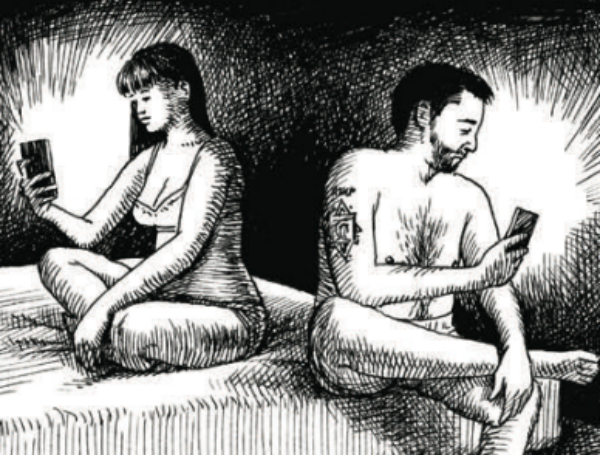I Have a Headache
Forget about the joy of sex. Netflix addiction, woke culture and dating apps have made getting it on a chore
By Zoe Strimpel
September 23 2019
Sex is in trouble. Despite its apparent ubiquity in the media, from dating apps to Love Island, we are actually having less of it and seem to be enjoying it less than ever before. Strangely, that’s especially the case among young adults. In the States, research has shown the proportion of Americans aged between 18 and 29 who reported having zero sex between 2008 and 2018 doubled to 23 per cent – a bigger proportion than the over-50s.
What’s true there is almost certainly true here, too. In a world in which dating is now done almost exclusively by app, the manoeuvring required to turn digital profiles into flesh and blood encounters has become a running joke. More seriously, a generation has come of age programmed to ‘swipe right’ jadedly past face after face – and it shows. It shows in the angry, bossy or monosyllabic profiles exhibited in the apps, in the way ‘ghosting’ (suddenly disappearing, possibly forever) has become a perfectly legitimate exit from a developing relationship, and in the apparent boredom or even reluctance with which sex is now greeted. In the US research, what sent eyebrows soaring highest was this: Far more young men were going bonk-free than women, with rates tripling to 29 per cent.
Young men, traditionally the lustiest demographic, are either declining sex, point blank, or are too confused about how to approach it to actually do so. Late August saw the updated English language translation, with much fanfare, of Respect: Everything a Guy Needs to Know about Sex, Love and Consent, a manual aimed at teenage boys. Its author, Inti Chavez Perez, saw how sorely the new generation of young men need help, crippled as they are by a mixture of physical insecurity and porn-induced misconceptions about real-life intimacy. No wonder, in this climate of miserable doubt, men in their 20s and 30s are increasingly suffering from erectile dysfunction. Cosmopolitan magazine noted this phenomenon in a survey: “There are a lot more millennial men experiencing [it] than we all thought.”
Meanwhile, other recent studies have suggested that an addiction to the likes of Netflix and Amazon Prime streaming services, as well as the rise of online gaming, is killing off action in the bedroom. And while you could hardly bemoan a remarkable statistic, revealed last year, that teenage pregnancy rates in Britain have fallen by 55 per cent in the last decade, the reasons given were revealing, too. It’s not just because kids are suddenly more judicious in their use of birth control, but because ‘lifestyle changes’ are meaning they simply stay at home.
In fact, the nearest most of today’s teenagers get to fooling around is some illicit sexting from their parents’ sofas (really).

Who can blame them, when they have not just the horrors of the online dating world to look forward to, but the havoc that political correctness is reaping on the joy of a hook-up? Sex used to be shrouded in mystery and excitement. Yet thanks to the extension of wokeness into the bedroom, combined with the will to explore all predilections, the erotic has become an exhausting parade of skills and wants, requiring ever-greater willingness to break new ground, try new things and push new boundaries.
Mainstream dating apps are awash with people identifying as ‘ethically non-monogamous’, ‘ethically polyamorous’, ‘monogamish’, ‘a-romantic’ (not desirous of a romantic relationship), pansexual (attracted to all genders, sexualities and sexual identities), sapiosexual (turned on by intelligence), heteroflexible (mostly or sometimes heterosexual). It’s like a clearing house of kink – whatever happened to a sense of mystery?
Being able to pinpoint every desire, need and gradation of comfort may have streamlined the orgasm process, and opened some horizons, but it’s also terrible for sexiness. Perhaps it’s unsurprising that the endless chatter and adjustment now required for an enlightened sexual encounter, the calibration of the needs and wants of partners in real time, has taken a toll on the erotic life. For this, a certain amount of shutting up and getting on with it is handy, but increasingly impossible. Foucault was right: Sex is the secret that is never fully told. Never have we tried harder and more loquaciously to out its riddles.
Sixty years since the dawn of the sexual revolution, today’s generation find themselves lost in a frosty romantic hinterland of wants and taxonomies, animated by power-play rather than passion; kink rather than personality. That’s for those of them who can still be bothered. Unprecedented numbers, as the data make all too clear, simply can’t.
